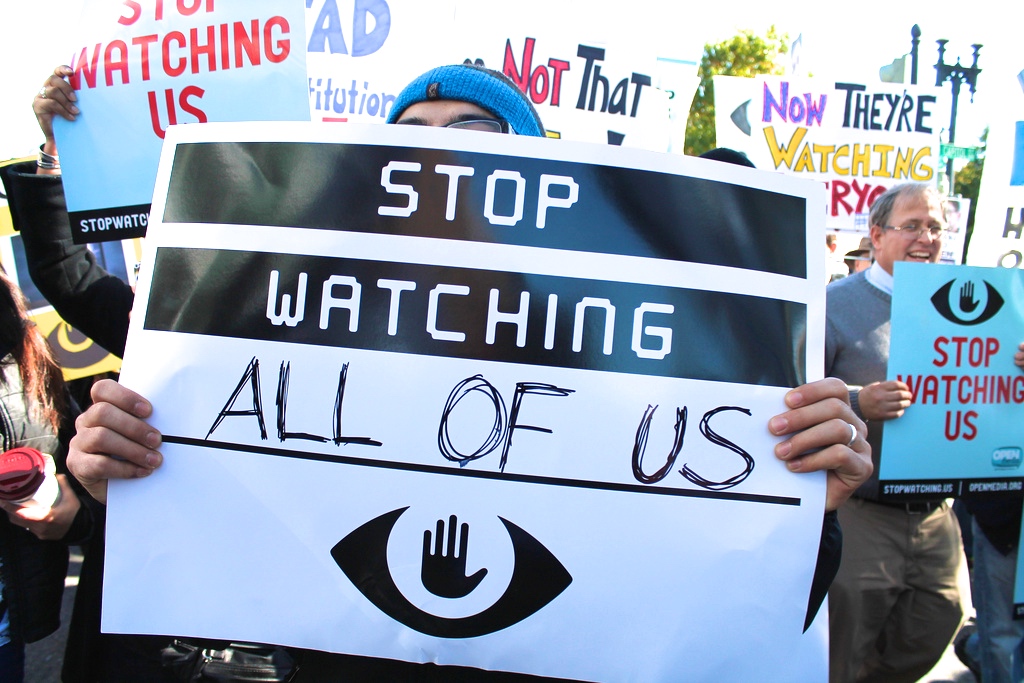by Max Wilbert / Deep Green Resistance
Lately, I have been writing a series of introductory articles on the importance of skills and equipment for revolutionaries. Part of my thesis is that gaining skills and gathering equipment is important not only for practical reasons, but also because it opens up new possibilities and removes barriers in our thinking that we didn’t even know were there.
The situation is similar when it comes to digital communication.
We all know that we live in a world of ubiquitous surveillance. Most of us walk around every day with a phone in our pockets that is constantly tracking our location and sending that data to corporations, who bundle it and sell it to the highest bidder. All our web traffic is monitored and recorded, as are our phone calls, text messages, emails, video chat calls, and so on.
Political dissidents are an especially high-priority target.
This surveillance leads to a form of self-censorship whereby we don’t discuss important topics essential to developing resistance organizations and planning and carrying our revolutionary actions.
The only final solution is to dismantle the surveillance system and the institutions (capitalism, patriarchy, empire-culture, civilization) that depend on and lead to it. But pending that outcome, we can fight back in other ways. Here are a series of concrete recommendations for upping your privacy and security game.
Once again, this is an introduction to this topic, and isn’t meant to be comprehensive. Do your own research and be cautious.
Use a VPN or Tor for everyday web browsing
A VPN, or Virtual Private Network, adds a reasonable level of privacy and security to everyday web browsing. Look for a well-regarded platform that doesn’t keep any logs and is not based in the United States or in the territory of close allies. These are cheap and essential in the age when net neutrality is dead, and one subscription can work for multiple devices (laptop, tablet, phone, etc.). Take one hour to purchase and start using a VPN as a priority action.
To bring your security to a higher level, use Tor Browser. Tor is not only essential for high risk online activities, but for normalizing privacy for everyone using the web. It’s easy to use side by side with your regular web browser.
Encrypt data
Almost all phones, tablets, and computers now have simple disk encryption built-in. Enable this function on all your devices. Use strong passwords/passphrases. If you have a habit of forgetting passwords, use a password manager to organize your data. Don’t use the same password for multiple accounts.
Use secure chat/call apps
Today there are multiple easy-to-use, free apps for encrypted communication. These include Signal and Wire. Download these apps and use them instead of standard phone calls, text messages, and video chat whenever possible. These apps are well-regarded in the professional security community and your data should be inaccessible to eavesdroppers.
Keep your devices secure
All your encryption is worthless without physical security. If you leave your computer sitting in a hotel room, a state agent can gain access, open your computer case with a screwdriver, and install a keylogger inside. Next time you login, that device can send your passphrase to the agent, and your security is compromised.
This is just one example of a physical attack.
Keep your devices inside your control at all times. Don’t let strangers or people you don’t trust fully use your devices. If the state does gain access to your device, consider keeping that device disconnected from the internet, wiping all your data, selling it, and buying a new one (as I did after my laptop was searched at the U.S./Canada border).
Don’t share all location data
As I mentioned above, all cell phones (including “dumbphones”) track your exact location any time there is service, and share that information with your service provider and any partners/law enforcement agencies. Consider as well that most smartphones have ~6 microphones in them.
The solutions to this are simple. First, consider leaving your phone at home or in another location. Leave it off as much as possible, and in the bottom of a bag or other location where sound is muffled and eavesdropping is not possible. It is not overkill to purchase a “faraday bag” which blocks all radio waves in and out of your device. These can be purchased cheaply and allow you to carry your phone with you privately, only removing it in innocuous locations when you wish to use it.
Cover cameras
Any cameras in internet/cell-network connected devices can be hacked. Cover them with tape or stickers unless they are actively in use.
Other recommendations
Corporations sell data and provide it to government agencies without warrants or probable cause regularly. In general, your data will be much safer if you use non-corporate products, or only corporate products that are zero-data services.
For example, use Firefox (with privacy-enhancing add-ons such as uBlock Origin, Decentraleyes, Disable WebRTC, HTTPS Everywhere, Privacy Badger, NoScript, etc.) instead of Chrome or Safari. Use OpenStreetMap instead of Google Maps. Use DuckDuckGo instead of Google for search.
Conclusion
As I’ve already said, this is just a beginning. While these recommendations will help improve your privacy, they are not foolproof. Attacks and defense methods are always changing. However, the weakest link in most secure computer systems is the human element. Install software updates, use methods recommended by trustworthy privacy advocates, and use common sense. Remember that the goal here is freedom of action, not perfection.
Additional resources:
- https://deepgreenresistance.org/get-involved/security-culture
- https://prism-break.org/
- https://ssd.eff.org/
- https://www.privacytools.io/#vpn
- https://www.reddit.com/r/privacy/wiki/index
- https://inteltechniques.com/podcast.html


Trackbacks/Pingbacks